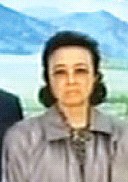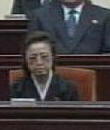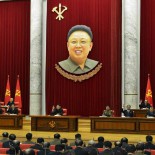The Women around Kim Jong-il
(n.b. This will be the first in a series of occasional postings about the people and personalities close to Kim Jong-il. Some of this will relate to succession issues or to the broader dynamics of Pyongyang’s internal politics.)

Kim Kyong-hui in June 2009.
Kim Kyong-hui
No other North Korean knows Kim Jong-il better, or has a longer relationship with him, than his sister, Kim Kyong-hui. When Kim Il-sung remarried in the early 1950’s, Kim Kyong-hui and Kim Jong-il more or less formed their own family unit, and General-Secretary Kim became highly protective of his younger sister from their step-mother and their father. When the late DPRK President Kim Il-sung attempted to break up her courtship with future husband Jang Song-thaek , Hwang Jang-yop was struck by how “she was direct and very intelligent.” Kim Kyong-hui has served in a few key KWP positions working in the International Department (under Kim Yong-nam) and the Korean Democratic Women’s Union (under her step-mother, Kim Song-ae). For twenty-one (21) years she has been a member of the KWP Central Committee and since 1987 director of its Light Industry Department or Economic Policy Inspection apparatus. She also had an informal executive role in Office #35 (the External Liaison Department).
Kim Kyong-hui has served as her brother’s eyes and ears in the DPRK and within the Kim Family. During the 1990’s Ms. Kim conducted her own inspection tours under the auspices of her management of the Light Industry Department. Not requiring the elaborate security preparations for Kim Jong-il’s appearances, Ms. Kim has reportedly dropped in on North Korean factories. This has afforded General-Secretary Kim more candid reporting than he receives from his subordinates. Kim Kyong-hui has also managed General-Secretary Kim’s sometimes thorny relations with the Kim Family.

Kim Kyong-hui
The extended Kim Family is more or less hermetically sealed from all but the top elite of the North Korean population, and Kim Jong-il does not have a subordinate to whom he can delegate such sensitive interpersonal tasks, as he does in managing the Party or State. Ms. Kim maintains General-Secretary Kim’s relationships with Kim Il-sung’s elderly in-laws and members of the Kang family. Kim Kyong-hui was tasked as an intermediary with the late Song Hye-rim, and informed Ms. Song of her exile from the DPRK. Ms. Kim was said to have a close relationship with the late Ko Yong-hui. It is highly likely Kim Kyong-hui who dispatched Kim Jong-nam (with whom she has a very close relationship) to Europe to solicit medical treatment after Kim Jong-il’s stroke in late summer 2008.
Kim Kyong-hui currently enjoys a more public profile. She is the only woman who holds a Department Director title in the KWP Central Committee’s subordinate departments. According to reports in early 2008, she and Jang Song-thaek have hosted dinner and music parties for North Korean elites at their palatial Pyongyang residence. She attended the 12th Supreme People’s Assembly (a body of which she has been a member since 1990) and was listed on the platform list of the KWP Central Committee’s memorial meeting on the 15th anniversary of Kim Il-sung’s death. She has joined General-Secretary Kim’s travel party on his guidance tours, most recently in October of this year watching a performance at the North Hwanghae Provincial Art Theater. Kim Kyong-hui has personal ties to KWP Secretaries Kim Ki-nam and Kim Jung-rin, SPA Presidium President Kim Yong-nam, United Front Director Kim Yang-gon and KPA Gen. Hyon Chol-hae.
Kim Kyong-hui’s role in succession politics and potential contingencies is significant. Singly, she will ensure the extended Kim Family supports the succeeding regime. With her husband Jang Song-thaek she will be an essential adviser and operative in support of Kim Jong-un, the alleged hereditary successor, or she work with her husband to guarantee a less rocky transition than expected by Pyongyang watchers, and hold a key management position in the post-KJI era. Conversely, if there is a power competition among North Korean elites or General-Secretary Kim loses central command and control, Kim Kyong-hui will most likely be one of the first elites to depart the country.
Kim Kyong-hui is also mother of another dark-horse succession candidate, Jang Kim-sung (born ca. 1979). The young Mr. Jang studied in Sweden in the late 1990’s. He should not be confused with a man named Kim Hyun, said to be the love child of Kim Il-sung and his nurse and adopted into the Jang-Kim household. An account surfaced this year that Kim Hyun was executed around 2001.

Kim Ok
Kim Ok
Kim Ok perhaps has the closest relationship to General-Secretary Kim. She is said to be his fifth domestic partner, although there are disputes as to whether she bore any children from her relationship with Kim Jong-il. She was born in the early 1960’s and attended the Pyongyang University of Music and Dance. She was a pianist in the 5th Cadres’ Section of Kim Jong-il’s Personal Secretariat, providing musical entertainment at dinner parties and music performances for General-Secretary Kim and members of the KWP Central Committee. In the late 1980’s, Kim Ok was promoted within the Personal Secretariat and became an administrative secretary and household manager to Kim Jong-il. Unlike Kim Jong-il’s previous wives/domestic partners who were related to North Korean elites (Hong Il-chon; Kim Yong-suk) or professional entertainers (Song Hye-rim; Ko Yong-hui), Kim Ok was actually involved, albeit in a clerical context, in the policy process in the DPRK and has some personal and professional ties to North Korean policymakers.
For a number of years, Kim Ok was said to been in the support staff on VMAR Jo Myong-rok’s 2000 trip to the United States. Former sushi chef Kenji Fujimoto disputes that Ms. Kim is the same woman who appeared in photographs from that trip. Kim Ok did appear in 2000 with Kim Jong-il, at the Inter-Korean summit meeting with the late ROK President Kim Dae-jung. She also traveled with General-Secretary Kim in 2006 to China where she may or may not have been introduced to Chinese officials as Kim Jong-il’s wife.
Since 2006, Kim Ok’s power in Kim Jong-il’s Personal Secretariat has steadily increased. She is said to have daily operational control over the Third Floor, managing General-Secretary Kim’s personal finances and ladling out gifts to North Korean elites. This is due in part to the 2006 Macau arrest of Personal Secretariat Director Kang Sang-chun, who was allegedly involved in illegal land swaps; Mr. Kang was released, but like Kim Jong-nam’s 2001 passport arrest, this stained his reputation in the Haebangsan-dong court. Kim Jong-il’s 2008 health problems saw Kim Ok becoming a conduit between General-Secretary Kim’s sickbed and the National Defense Commission. It seems Ms. Kim took on a kind of Edith Wilson role communicating messages from and to the General-Secretary, and facilitating the paper traffic. No doubt, Kim Ok did not operate independently, as Jang Song-thaek is reported to have assumed some executive powers at this time.
Kim Ok’s power is found in her daily, personally intimate access to Kim Jong-il. Many Pyongyang watchers believe that she is highly influential in the succession process–which is to say she can tip the scale in favor of one person over the other. Kim Ok is said to be a supporter of Kim Jong-un. However, if Kim Jong-un did trespass the Guard Command, as alleged by some reports, it is likely Ms. Kim was involved, to a certain degree, in the punitive response, the tamping down, if you will.
Kim Ok is reputed to have close personal ties to OGD Senior Deputy Director Ri Je-gang. While Ms. Kim interacts with Jang Song-thaek, Kim Kyong-hui, Gen. Hyon Chol-hae and Gen. Ri Myong-su, the nature of their relationships is not known and accounts are mixed. Things can not be so bad, as all of the above-named individuals have daily access to General-Secretary Kim, and Jang/Kim and Gens. Hyon and Ri have seen their respective power and influence continue to ascend.
Ms. Kim is purely a creature of the Personal Secretariat which is to say any power and influence she has is predicated on a living, sentient General-Secretary Kim. Members of the Personal Secretariat seldom interact with other North Korean elites and are forbidden from forming the kind of political networks on which elites base their power. Personal Secretariat employees also possess neither State identification documents nor social security cards, exacerbating their “non citizen” status. This differentiates her from North Korean elites such as Jang Song-thaek/Kim Kyong-hui, Ri Je-gang or Gens. Hyon and Ri. It is highly unlikely in the event of a contingency or Kim Jong-il losing his command and control, Ms. Kim will seize power or make any attempt so to do. Kim Ok could buy time for the succeeding regime, if General-Secretary Kim were to pass away or become physically incapacitated. News of the Wonsu’s demise are the informational means for the succeeding regime to take command and control over the internal security apparatus, constituencies that manage civilian and military life in the DPRK. If Kim Ok unexpectedly turns up in Europe with heavily weighted luggage and a sheet of paper with account numbers, this would indicate a serious power competition in the DPRK.
Kim Sol-song

Kim Sol-song
Arguably Kim Jong-il’s favorite child, Kim Sol-song was the first grandchild acknowledged and, in conforming with tradition, named by Kim Il-sung. She was born around 1974. Unlike her half- and step-siblings she was educated domestically in the DPRK, including attending Kim Il-sung University She speaks several languages (including English and Russian) and is conversant in foreign policy, economics and literature. Kim Sol-song worked in her late grandfather’s Presidential Office and the KWP Propaganda and Agitation Department. Since the late 1990’s, she has been employed in Kim Jong-il’s Personal Secretariat where she holds a Department Director’s position, presiding over Office #99 which is said to manage some of General-Secretary Kim’s financial accounts and as well as technology (computers and software) acquisition.
Kim Sol-song has escorted her father on his guidance and inspection tours, as his aide. She has also served as her father’s interpreter in meetings with foreign heads of state, and traveled to Russia with him in 2002. Kim Sol-song is highly valued as an adviser and aide to General-Secretary Kim. According to a couple of reports, she was reported as wearing a KPA Lieutenant Colonel’s uniform on guidance tours and may hold an unofficial rank in the Guard Command, over which she is likely tasked with some administrative oversight. With Kim Ok, she shares responsibility for managing Kim Jong-il’s calendar, travel schedule and security arrangements. Unlike Kim Ok, Kim Sol-song has political and policy credibility and should be viewed as highly influential in decisions affecting succession and contingency planning. Circumstantially, she has a position of import among North Korean elites as she is directly and legitimately linked to Kim Il-sung, in addition to years of service in KWP departments. She most likely has personal and professional ties to MAR Ri Ul-sol, Gen. Hyon Chol-hae, Gen. Ri Myong-su, KWP Secretary Kim Ki-nam, PAD Director Cho Ik-gyu and PAD Senior Deputy Director Ri Jae-il. She has familial and political ties to Jang Song-thaek, Kim Kyong-hui, VMAR Ri Yong-mu and Kang Sok-ju.
One might want to view Kim Sol-song as a Third Generation Kim Kyong-hui, in that she is not only a descendant of Kim Il-sung, but educated, politically savvy and, at the age of 35, a seasoned veteran of the bureaucratic competitions among North Korean elites. Because of Kim Ok’s alleged ties to deputy directors in the Organization and Guidance Department and the National Defense Commission, it is highly likely that her opinions regarding succession and contingency planning may be taken more seriously by General-Secretary Kim because she could be viewed as a disinterested party. It is also likely that an important role has been designed for her in a post-KJI regime, and it would not be surprising to see her holding a significant support role in both a hereditary, or collective succession. If the North Korean elites (including General-Secretary Kim) could subsume their patriarchal sexism, Kim Sol-song is the ideal candidate for hereditary succession. This would be the Empress Myeongseong scenario previously put forth by the eminent Dr. Mansourov.
Kim Yong-suk
Kim Yong-suk is the daughter of a KPA General tied to Kim Il-sung, and was a clerical worker for the Ministry of Public Security’s provincial branch in North Hamgyong when her marriage to Kim Jong-il was arranged in 1973. She is Kim Jong-il’s official wife, which is to say his legal wife and the only domestic partner recognized by Kim Il-sung. Kim Yong-suk and General-Secretary Kim have two daughters: Kim Sol-song and Kim Chun-song. She was living with General-Secretary Kim in the early 1980’s, prior to his establishing his household with Ko Yong-hui. Kim Yong-suk appeared in formal photographs with Kim Jong-il as recently as 2002, but she does not participate in DPRK political or public life. There are accounts that like members of Kim Jong-il’s Personal Secretariat, she does not possess pertinent citizens’ documents. A handsome woman at the age of sixty-two (62), Kim Yong-suk resides in a villa in Pyongyang and is reported to travel regularly to Europe.
